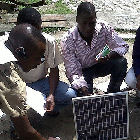Send to a friend
The details you provide on this page will not be used to send unsolicited email, and will not be sold to a 3rd party. See privacy policy.
The state of Lagos has set up an advisory council to guide it towards becoming an innovation hub for West Africa. Emeka Johnkingsley reports.
For a long time, the Nigerian state of Lagos — containing a former capital of the country and its most populous and economically significant state — was widely seen as overcrowded, inefficient and chaotic, even by African standards.
Over the past few years, however, under the leadership of its reforming governor, Babatunde Raji Fashola, the government of the state has been steadily transforming this image, turning Lagos into what is rapidly becoming one of the most vibrant and best-managed growth points of West Africa.
As part of this renaissance, the government is taking on a leading role in promoting science, technology and innovation as core policy areas that not only hold the key to the state’s future, but could also make it one of the continent’s innovation leaders.
To help achieve this goal, Fashola has set up a 20-member Innovation Advisory Council, chaired by the state’s commissioner for science and technology, Adebiyi Mabadeje, to serve as the state advisory body on research and development, enterprise promotion and innovation.
The role of the council is to help strengthen the capacity of Lagos through science, and develop strategies for innovation and innovation management, that will in turn reduce poverty and lead to job creation.
”We must be under no illusion,” Fashola told the inaugural meeting of the advisory council last September. ”Cities who fail to harness the power of innovation will eventually become the customers of those that do.
”But we are fortunate, because for the average Lagosian, innovation is in the DNA. We have to consistently find new ways to combat local challenges and deliver previously unforeseen value.”
As the commercial hub for West Africa, the implications of innovation-driven growth for Lagos ”are both exciting and alarming”, said Fashola.
A failure to frame and harness innovation might consign future generations of Lagosians to material dependency on those African cities that had seized the mantle when they had the opportunity, he added.
”We must be able to drive economic change by creating an environment in which entrepreneurs can come up with the most innovative products and services, and then successfully commercialise the end products.”

Lagos is seeking to build its economy around a commitment to innovation
Flickr/cmakin
The state has already been working with the Kennedy School of Government at Harvard University in the United States on ways to strengthen its capacity as a driver of regional development through science and innovation.
Both the creation of the Innovation Advisory Council and the setting up of innovation enterprise vehicles are recommendations that have emerged from this work.
With members drawn from the private sector, government and the academic community, the council’s role will be to draw together ideas for government action, and also to identify opportunities for working with other states and countries.
A plan of action, detailing more concrete steps to promote innovation in the state, is being developed and is due to be unveiled in August. In addition, an innovation conference — intended to bring together potential stakeholders including both funders and those with projects looking for support — is scheduled for December.
According to Moji Rhodes, secretary of the council, there is an awareness that Lagos — the largest city in Sub-Saharan Africa — needs to make the best use of the resources in its people, which is why it is now working on a number of strategies to drive innovation.
Four initiatives top the innovation agenda being finalised by the council. One is to create an ”innovation map” of the state to identify clusters of people engaged in some form of innovation, such as computer programming or designing and constructing solar panels.
A second initiative is to develop a state policy on science, technology and innovation. Rhodes said that the council is looking closely at countries such as Brazil, India and Israel to learn how to use innovation for social development.



Innovation maps would show clusters of people working on innovations, such as those in solar panels
Flickr/350.org
To support these initiatives two funding mechanisms are being set up. The Lagos Innovation Fund is intended to finance innovative ideas from across the state, whereas the Research and Development Fund is dedicated to harnessing the large number of innovative ideas emanating from schools at all levels.
”For each of these [funds], people will submit their ideas,” explained Rhodes. ”We will assess their proposals and see if we are able to help.”
She stressed that the funds will seek not only contributions from the state government and the private sector, but also grants from international donors and development agencies. The goal, she said, was to develop a system of innovation in Lagos that would outlive governments.
One practical project is the creation of a web portal to which individuals can send innovative ideas to have them assessed by both technical experts and potential investors. ”We will act as a conduit between the innovators and society,” said Rhodes. The portal is expected to be in operation by August.
Another project involves setting up co-ordinating desks for the advisory council in schools and key institutions to bring them closer to the council, and arrange training for students in the skills required to achieve effective innovation.
Olusegun Adewoye, director general of the National Agency for Science and Engineering Infrastructure, praised the efforts of the state in placing innovation at the heart of its development agenda and pledged his agency’s assistance.
”They seem to know what they are doing,” he told SciDev.Net. ”It is in the right direction and everybody should assist them, so that their efforts will be deep rooted.”
Adewoye added that Lagos was a big state and that ”if you do not give people jobs, you are looking for trouble”.
He was confident that the initiative will increase income, jobs and peace. ”There are things that Lagos state is doing that still involve a lot of foreign contractors, but could be done locally, once they develop their science and technology properly,” he said.
Oye Ibidapo-Obe, president of the Nigerian Academy of Science, also commended the state for the innovation initiative, describing it as a ”welcome development” and calling on other states of the federation to adopt similar policies.
At the same time, he told SciDev.Net that he hoped the new advisory council would generate significant changes and did not turn out to be ”one of those committees that are simply ‘paper tigers”’.













